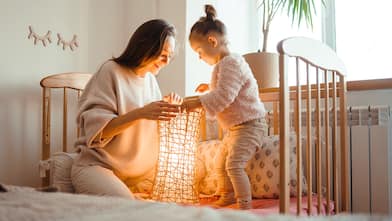We got you, baby
Babies are adorable little additions to your family, but their safety can be a source of much stress when you think about everything you need to do to make your home a safe place for them. Getting your home ready for your baby is something you know needs to happen, but where do you start? This guide will give you nine practical tips you can use to make your home a safe place for them.
1. Get Down to Their Level
Picking up everything you see that’s dangerous for your baby to be around? Check. But the viewpoint of your little person exploring life on their hands and knees is far different from yours. One of the best ways to babyproof your house is by getting on your floor and picking up everything that’s not supposed to be there. A small Lego under the couch or maybe a nail from a previous DIY project? Pick it up.
You’ll want to get on their level and check the floor in every room they’re in frequently, such as the living room, nursery, kitchen, and bathroom—and even areas they don’t go in often, such as your home office and laundry room.
2. Invest in Safety Covers and Locks
Children are curious little beings. They like to touch, grab, yank, err, you get the picture. So, to help keep them out of places they shouldn’t be and away from electricals, here’s a pro home safety tip: Invest in safety covers and locks.
Here’s a list of some places around your house you’ll need them:
Outlets
Extension cords
Doors
Windows
Gun cases
Cabinets
Stove
Dishwasher
Fridge
Garbage can
3. Check Your Furniture
The furniture throughout your home is most likely safe by adult standards, but what about for a baby? While you might know not to pull too hard on your end table or it might fall, your baby who’s pulling themselves up using your furniture doesn’t. So, check all of your furniture to make sure it’s sturdy and not easy to topple over.
You’ll also need to check your furniture for sharp edges. It’s common for babies and children to run into sharp corners. Remove any furniture in your home with sharp corners, such as your coffee and end tables, and replace them with safer ones. Or cover those corners with silicone padding if you can’t remove them.
Children are also keen on spilling food and liquids, so check if your furniture is forgiving on stains. If not, consider investing in a slipcover or vacuum with a shampoo attachment.
4. Utilize Baby Gates

Babyproofing your house rule 101: Use baby gates. The purpose of baby gates is to keep babies out of places they don’t belong. You can use them on stairs and anchor them in place or block your kitchen from your living room if you have an open floor plan.
5. Keep Chemicals Out of Reach
Keep any hazardous chemicals out of your baby’s reach. You can do this by hiding all household chemicals, detergents, and cleaning tools off the floor and in an area that’s out of sight, like a hard-to-reach cabinet. Also, place a cabinet lock or cover on it for added protection.
6. Store Items Not in Use
Store items not currently in use somewhere secure and safe, out of the reach of your baby’s curious little hands. Here’s a list of things to put away:
Sharp objects, such as kitchen knives
Small appliances, such as blenders
Glass bottles or jars
Plastic bags
Foil, wax paper, and plastic wrap
Blow-dryer
Toilet brush
7. Set Your Water Temperature
If your baby starts playing in the water around your home, you don’t want them to burn themselves accidentally. Set your water heater to a maximum of 120 degrees Fahrenheit.
8. Be Prepared

We know it’s not humanly possible to prepare for everything—and we don’t expect you to. When babyproofing your house, your goal is to stay prepared for situations that can be hazardous. So, here are a few things you can do to prepare yourself for the wonders of parenting:
Keep a first aid kit at home.
Consider a pool alarm.
Check your carbon monoxide and smoke detectors to ensure they’re working.
Invest in a playpen to create a safe place for your baby to play when you’re busy.
Use ground-fault circuit interrupter (GFCI) outlets.
Childproof your windows by using cordless blinds or hiding them away.
Add a thick carpet for extra cushion during tummy time and when they’re learning to crawl and walk.
Keep matches or other fire-starting material away from your fireplace, and never leave your baby near one unattended while it’s in use.
Remove all small decor, such as refrigerator magnets.
9. Know When to Call a Pro
Expecting a new addition to the family can be a stressful time in anyone’s life. If you’d rather focus your energy on other tasks like decorating the nursery or getting baby supplies ready for the birth of your little bundle of joy, hire a local babyproofing service to handle all the safety work for you.





